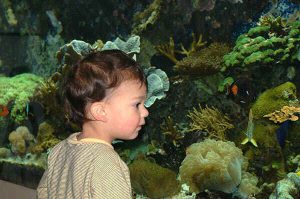Before retiring three years ago, I was a Professor of the Humanities for 33 years at Pratt Institute. Finding that out has often led aquarists to ask me how I got so heavily involved in our hobby. Usually, I replied that it started with several freshwater tanks when I was about 10 years old, but this was not really an answer. In any case, the largest was a Metaframe 20 gallon long tank. To my young eyes that tank was enormous. Strange as it may seem, I still remember the scientific names – memorized from Innes’ famous book, The Complete Aquarium Book– William T. Innes; 1936 Halcyon House — of all the freshwater fish I had during those years. Learning that the black tetra was called Gymnocorymbus ternetzi gave me a sense of power. Much later I came across James Baldwin’s famous words, The root function of language is to control the universe by describing it. Neither my parents, nor my friends, nor my relatives kept tropical fish. It was not from them that I acquired my passion for our hobby. Until recently, I really didn’t have an answer to the question of the origin of my passion for our hobby.
My oldest grandson, now almost two years old, in his innocent delight with my aquarium, supplied me with the sought-after answer. Check my recent photograph of him mesmerized by my reef tank. One of the first things my grandson does when he comes to visit is to go to the reef tank, climb up on a step stool, and gaze at the incredible shapes and colors. Youngsters like him are not only the future of our hobby, but perhaps of our planet’s natural wonders as well. It is here that the passionate love of natural beauty begins. It will lead some of us to fight for the environment, and even lead many of us, who are not scientists, electricians, plumbers, etc to learn more chemistry, biology, physics, and even electrical and plumbing skills. The more we know, the more we learn, the more the wonders of the natural world fascinate. There’s an old Buddhist proverb that states that if you want to be happy for a day fall in love, for a week get married, but for a life time, plant a garden.
With this issue we have made a few changes to help aquarists get accurate, honest answers to their questions. We are opening up our magazine forums and renaming them “The Advanced Aquarist’s Forums.” Not only will our users be able to ask questions about the magazine articles – now the forums will be open for you all to ask our “Advanced Aquarist’s” questions in their areas of considerable expertise. Because we have such a broad range of contributors, if one of these aquarists is unavailable, another should be able to step in to answer your question. To access these forums, click on Advanced Aquarist’s Forums
With this issue, we are adding additional content. Randy Donowitz will pick up where he left off from his beginner’s column called “Reef Keeping 101” for Aquarium Frontiers, to his new column “Reef Keeping 102.”Rob Toonen, Ph.D. in the first of many columns for the Advanced Aquarist, using the question and answer format, tackles feeding nonphotosynthetic gorgonians. In this month’s Photo Gallery, Greg Schiemer, offers a picture of an anemone that divided into three animals over night. Best of all, Greg, whose husbandry and photography skills are unsurpassed, has agreed to do a regular column on marine fish. Look for it soon in a future addition of Advanced Aquarist. Another innovation with this issue of the Advanced Aquarist is the introduction of short, informative articles, which we call “Short Takes.”




0 Comments